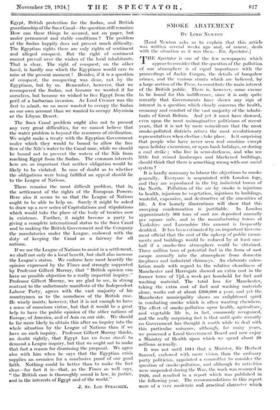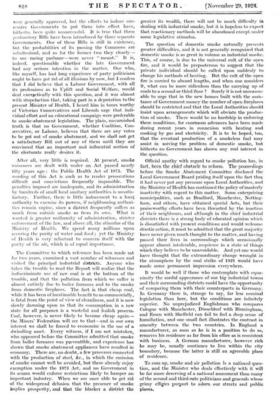SMOKE ABATEMENT
By LORD NEWTON [Lord Newton asks us to explain that this article was written several weeks ago and, of course, deals with the situation as it was then.—En. Spectator.] THE Spectator is one of the few newspapers which appear to consider that the question of the pollution of our atmosphere is of equal importance with the proceedings of Jackie Coogan, the details of bungalow crimes, and the various stunts which arc believed, by a large section of the Press, to constitute the main interest of the British public. There is, however, some excuse to be found for this indifference, since it is only quite recently that Governments have shown any sign of interest in a question which closely concerns the health, economy and comfort of the vast majority of the inhabi- tants of Great Britain. And yet it must have dawned, even upon the most unimaginative politicians of recent years, that it is not by mere coincidence that the most smoke-polluted districts return the most revolutionary representatives when eleetioc r, take place. IS it surprising that • people who have never seen real sunshine except upon holiday excursions, or upon bank holidays, or during a coal strike ; who live .in semi-darkness, and who see little but ruined landscapes and blackened buildings, should think that there is something wrong with our social system It is hardly necessary to labour the objections to smoke generally. Everyone is acquainted with London fogs, and they are reproduced in the big industrial towns of the North. Pollution of the air by smoke is injurious to health, injurious to vegetation, injurious to buildings, wasteful, expensive, and destructive of the amenities of life. A few homely illustrations will show that this sweeping condemnation is justifiable. In London approximately 300 tons of soot are deposited annually per square mile, and in the manufacturing towns of Yorkshire and Lancashire this amount is frequently doubled. It has been estimated by an important Govern- ment official that the cost of the upkeep of public monu- ments and buildings would be reduced by at least one- half if a smoke-free atmosphere could be obtained. Three million tons of potential fuel in the form of soot escape annually into the atmosphere from domestic fireplaces and industrial chimneys. An elaborate calcu- lation made with regard to the relative cleanliness of Manchester and Harrogate showed an extra cost in the former town of 7d. a week per houshold for fuel and washing material. The total loss for Manchester, taking the extra cost of fuel and washing materials alone, works out at about £300,000 a year, and yet the Manchester municipality shows an enlightened spirit in combating smoke which is often wanting elsewhere. The effect of smoke-pollution upon health, agriculture, and vegetable life is, in fact, commonly recognized, and the really surprising fact is that until quite recently no Government has thought it worth while to deal with this particular nuisance, although, for many years, we possessed a Local Government Board and now enjoy a Ministry of Health upon which we spend about 20 millions annually.
It was not until 1914 that a Minister, Sir Herbed Samuel, endowed with more vision than the ordinary party politician, appointed a committee to consider the question of smoke-pollution, and although its activities were suspended during the War, the work was resumed in 1920, and resulted in a report which was published in the following year. The recommendations in this report were of a very moderate and practical character which were generally approved, but the efforts to induce suc- cessive Governments to put them into effect have, hitherto, been quite unsuccessful. It is true that three perfunctory Bills have been introduced by three separate Governments. One of these Bills is still in existence, but the probabilities of its passing the Commons are infinitesimal, and as for the former two they clearly— to use racing parlance—were never " meant." It is, indeed, questionable whether the late Government had any serious intention in the matter. One who, like myself, has had long experience of party politicians ought to have got rid of all illusions by now, but I confess that I did believe that a Labour Government, with all its professions as to Uplift and Social Welfare, would deal energetically with this question, and it was almost with stupefaction that, taking part in a deputation to the present Minister of Health, I heard him in tones worthy of Victorian Conservatives and Liberals urge that indi- vidual effort and an educational campaign were preferable to smoke-abatement legislation. The plain, unvarnished truth is that no Government, whether Coalition, Con- servative, or Labour, believes that there are any votes to be got out of. smoke abatement, and we shall not get a satisfactory Bill out of any of them until they are convinced that an important and influential section of the electorate really desires it.
After all, very little is required. At present, smoke nuisances are dealt with under an Act passed nearly fifty years ago : the Public Health Act of 1875. The wording of this Act is such as to render prosecutions difficult and convictions frequently impossible. The penalties imposed are inadequate, and its administration by hundreds of small local sanitary authorities is unsatis- factory. Further, there is little inducement to a local authority to exercise its powers, if neighbouring authori- ties remain supine, since a district frequently suffers as much from outside smoke as from its own. What is wanted is greater uniformity of administration, stricter enforcement of the law, and above all, the stimulus of the Ministry of Health. We spend many millions upon securing the purity of water and food ; yet the Ministry of Health is very reluctant to concern itself with the purity of the air, which is of equal importance.
The Committee to which reference has been made sat for two years, examined a vast number of witnesses and visited the principal industrial districts. Anyone who takes the trouble to read the Report will realize that the indiscriminate use of raw coal is at the bottom of the trouble, and that the pollution from which we suffer is almost entirely due to boiler furnaces and to the smoke from domestic fireplaces. The fact is that cheap coal, while it has been of inestimable benefit to us commercially; is fatal from the point of view of cleanliness, and it is now slowly dawning upon us that its consumption in a raw state for all purposes is a wasteful and foolish process. Coal, however, is never likely to become cheap again— the Miners' Federation will see to that—and in our own interest we shall be forced to economise in the use of a dwindling asset. Every witness, if I am not mistaken, who appeared before the Committee admitted that smoke from boiler furnaces was preventible, and experience has shown that smoke abatement appliances have resulted in economy. There are, no doubt, a few processes connected with the production of steel, &c., in which the emission of smoke cannot well be avoided, but these already enjoy exemption under the 1875 Act, and no Government in its senses would enforce restrictions likely to hamper an important industry. When we are once able to get rid of the widespread delusion that the presence of smoke implies prosperity, and that the blacker a district the greater its wealth, there will not be much difficulty in dealing with industrial smoke, but it is hopeless to expect that reactionary methods will be abandoned except under some legislative stimulus.
The question of domestic smoke naturally presents greater difficulties, and it is not generally recognized that domestic smoke is as great in volume as industrial smoke. This, of course, is due to the universal cult of the open fire, and it would be preposterous to suggest that the private individual should be called upon suddenly to change his methods of heating. But the cult of the open fire is carried to absurd lengths, and when one considers it, what can be more ridiculous than the carrying up of coals to a second or third floor ? Surely it is not unreason- able to urge that in the new houses built with the assis- tance of Government money the number of open fireplaces should be restricted and that the Local Authorities should insist upon arrangements which will obviate the produc- tion of smoke. There would be no hardship in enforcing these conditions, for enormous advances have been made during recent years in connexion with heating and cooking by gas and electricity. It is to be hoped, too, that the eventual production of a smokeless fuel may assist in solving .the problem of domestic smoke, but hitherto no Government has shown any real interest in the question.
Official apathy with regard to smoke pollution has, in fact, been the chief obstacle to reform. The proceedings before the Smoke Abatement Committee disclosed the Local Government Board priding itself upon the fact that it had never put any pressure upon Local Authorities, and the Ministry of Health has continued the policy of masterly inactivity with regard to this matter. Some enterprising municipalities, such as Bradford, Manchester, Notting- ham, and others, have obtained special Acts, but their praiseworthy efforts have been thwarted by the inaction of their neighbours, and although in the chief industrial districts there is a strong body of educated opinion which is dissatisfied with present conditions and would welcome drastic action, it must be admitted that the great majority have never given much thought to the matter, and having passed their lives in surroundings which occasionally appear almost intolerable, acquiesce in a state of things which they believe to be unavoidable. And yet one would have thought that the extraordinary change wrought in the atmosphere by the coal strike of 1921 would have made some permanent impression everywhere.
It would be well if those who contemplate with equa- nimity the sordid appearance of our big industrial towns and their surrounding districts could have the opportunity of comparing them with their counterparts in Germany. In Germany there is, strange to say, far less nominal legislation than here, but the conditions are infinitely superior. No unprejudiced Englishman who compares Cologne with Manchester, Dusseldorf with Birmingham, and Essen with Sheffield can fail to feel a deep sense of humiliation, and one small fact illustrates the contrast in amenity between the two countries. In England a manufacturer, as soon as he is in a position to do so, removes his residence as far from his office as is consistent with business. A German manufacturer, however rich he may be, usually continues to live within the city boundary, because the latter is still an agreeable place of residence.
To sum up, smoke and air pollution is a national ques- tion, and the Minister who deals effectively with it will be far more deserving of a national monument than many of the second and third-rate politicians and generals whose grimy effigies purport to adorn our streets and public places.



























































 Previous page
Previous page